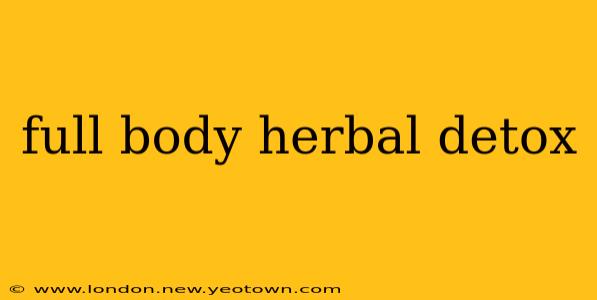Have you ever felt sluggish, bloated, or just plain off? Many people turn to a full body herbal detox as a way to cleanse their system and revitalize their health. But what exactly is a full body herbal detox, and how does it work? Let's delve into the world of herbal detoxification and explore its potential benefits and considerations.
This isn't a quick fix or a magic bullet; rather, it's a holistic approach that focuses on supporting your body's natural detoxification processes. Think of it as a gentle nudge, guiding your system towards optimal functioning. We'll explore the science behind it, address common concerns, and outline the key considerations for embarking on a successful and safe herbal detox journey.
What is a Full Body Herbal Detox?
A full body herbal detox utilizes the power of plants to support your body's natural elimination processes. Our bodies are remarkably efficient at removing toxins, but sometimes they need a little extra help. Herbal remedies, chosen for their specific properties, can assist in gently cleansing the liver, kidneys, and intestines – the primary organs involved in detoxification. These herbs may act as diuretics, promoting urination and the elimination of waste products, or as mild laxatives, aiding in bowel movements. Others may support liver function, assisting in the breakdown and elimination of toxins.
How Does a Full Body Herbal Detox Work?
The human body possesses a sophisticated detoxification system, involving the liver, kidneys, lungs, skin, and lymphatic system. These organs work tirelessly to filter and eliminate harmful substances. A full body herbal detox aims to support these natural processes:
- Liver Support: Herbs like milk thistle and dandelion root are known for their hepatoprotective properties, helping to protect and support liver function.
- Kidney Support: Herbs such as uva ursi and parsley can promote healthy kidney function and support the elimination of waste products through urine.
- Intestinal Cleansing: Herbs like psyllium husk and aloe vera can gently stimulate bowel movements, promoting the elimination of toxins through the digestive tract.
- Lymphatic Drainage: Herbs that promote lymphatic drainage can assist in removing waste products and supporting the immune system.
It's crucial to remember that this isn't about forcing toxins out; it's about supporting your body's inherent ability to do so efficiently.
What Herbs are Commonly Used in a Full Body Herbal Detox?
Many herbs have been traditionally used for their detoxifying properties. Some of the most common include:
- Milk Thistle: Protects and supports liver function.
- Dandelion Root: Supports liver and kidney function, acting as a gentle diuretic.
- Burdock Root: Supports liver and kidney function, considered a blood purifier.
- Uva Ursi: Supports urinary tract health and promotes kidney function.
- Parsley: Acts as a diuretic and helps eliminate waste products.
- Psyllium Husk: Supports healthy bowel movements.
- Aloe Vera: Supports healthy digestion and can have a mild laxative effect.
Does a Full Body Herbal Detox Really Work?
While anecdotal evidence suggests benefits, scientific research on the efficacy of full-body herbal detoxes is limited. Many of the claims surrounding detox programs lack rigorous scientific backing. However, the individual herbs used often have documented benefits for supporting specific bodily functions. For example, milk thistle's ability to support liver health is well-researched. The overall effect of combining these herbs in a detox program requires more study.
It’s important to approach herbal detoxes with a balanced perspective. Focus on the benefits of supporting your body's natural cleansing processes rather than seeking a dramatic, rapid "cleansing" effect.
What are the Potential Side Effects of a Full Body Herbal Detox?
While generally considered safe when used appropriately, herbal detoxes can have side effects. These can vary depending on the herbs used and the individual's health status. Some potential side effects include:
- Digestive upset: Nausea, diarrhea, or constipation are possibilities, particularly if high doses of certain herbs are taken.
- Allergic reactions: Some individuals may be allergic to specific herbs.
- Drug interactions: Herbal supplements can interact with medications, so it’s crucial to consult a healthcare professional if you are taking any medications.
- Dehydration: Diuretic herbs can lead to dehydration if you don't drink enough water.
How to Choose a Safe and Effective Herbal Detox Program?
Choosing a reputable source for your herbal detox is crucial. Opt for products from well-established companies with transparent labeling and quality control measures. Always consult with a healthcare professional or a qualified herbalist before starting any detox program, especially if you have underlying health conditions or are taking medications. They can help you determine if a detox program is right for you, recommend safe and appropriate herbs, and monitor your progress.
Remember, a healthy lifestyle that includes a balanced diet, regular exercise, adequate hydration, and stress management is crucial for overall well-being. A full body herbal detox should be seen as a supportive tool, not a replacement for healthy lifestyle choices.

